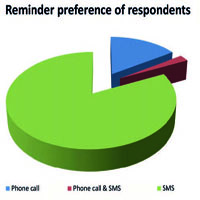The role of short message services (SMS) on childhood immunization in a tertiary health facility in Nasarawa State

Accepted: 12 August 2020
All claims expressed in this article are solely those of the authors and do not necessarily represent those of their affiliated organizations, or those of the publisher, the editors and the reviewers. Any product that may be evaluated in this article or claim that may be made by its manufacturer is not guaranteed or endorsed by the publisher.
Authors
Background: Immunization has remained the most cost effective strategy of reducing global childhood deaths and disabilities. The diseases and illnesses targeted by the process of vaccination to achieving immunization are termed Vaccine Preventable Diseases (VPD). Vaccine preventable diseases constitute a major burden to under-five morbidity and mortality in developing countries like Nigeria.This key strategy is being hindered by factors such as forgetfulness and accessibility challenges among others. This study seeks to evaluate the place of using remindersin the form ofShort Message Services (SMS) and or phone calls in improving health seeking behavior through immunization.
Materials and Methods: A questionnaire based cross sectionalstudies was carried out between 1st of July to the 31st of December 2019 on the Children Medical Wards of the DalhatuAraf Specialist Hospital. The role of SMS and preference of care-givers between SMS and phone calls on immunization activities was determined. Data analyses were done using the Statistical Package for Social Sciences (SPSS) version 20.
Results: The mean age of mothers in this study is 27.58±5.82 years, as most mothers (58.5%) were aged between 21-30 years. Almost all of the responders in this study were married except two (one single mother and a widow respectively). More than 90% had a phone. In spite of this, one fifth of the mothers agreed to have missed immunization at some point. Most (82.2%) of the responders believed using SMS as a reminder will reduce the rate of missed immunization. Loss of immunization cards and forgetfulness were the leading reasons for missed immunization in this study.
Conclusions: Most mothers in the present study believed SMS will reduce the rate of missed immunization and preferred it to phone calls.
How to Cite
PAGEPress has chosen to apply the Creative Commons Attribution NonCommercial 4.0 International License (CC BY-NC 4.0) to all manuscripts to be published.

 https://doi.org/10.4081/acbr.2020.84
https://doi.org/10.4081/acbr.2020.84



